Test
Test
Test language
Test language

While the ash from Duke’s coal-burning plant in Asheville is being cleaned up, neighbors about an hour down the road have not been so lucky. Residents in Rutherford and Cleveland counties live near Duke’s Cliffside Power Plant (James E. Roger’s Energy Complex), which continues to pollute the Broad River with toxic heavy metals including mercury, arsenic and lead. Recent water testing by MountainTrue confirms this finding, but Duke Energy has refused to clean up their toxic mess.
Toxic coal ash in any of Western North Carolina’s waterways is a threat to all of us. Join MountainTrue and the Broad River Alliance on Oct. 14 to tell Duke Energy we won’t accept their life-threatening pollution anywhere – even in more rural communities that often lack media coverage.
We will paddle a short section of the Broad River, stopping in front of the power plant for a photo with a banner that reads,“Protect Our Water, Move Your Ash!” You can bring your own boat, or borrow one from MountainTrue if we are notified in advance. Bring your own water and a snack.
Meet us at 11 am at the Old Cliffside Mill on Hwy 221-A, beside the bridge over the Second Broad. (We will have signs on the road directing you.) We’ll take out at Lake Hauser by 1 pm.
RSVP to the protest on Eventbrite here, or to the Facebook event page here.
Questions? Email us at eliza@mountaintrue.org.
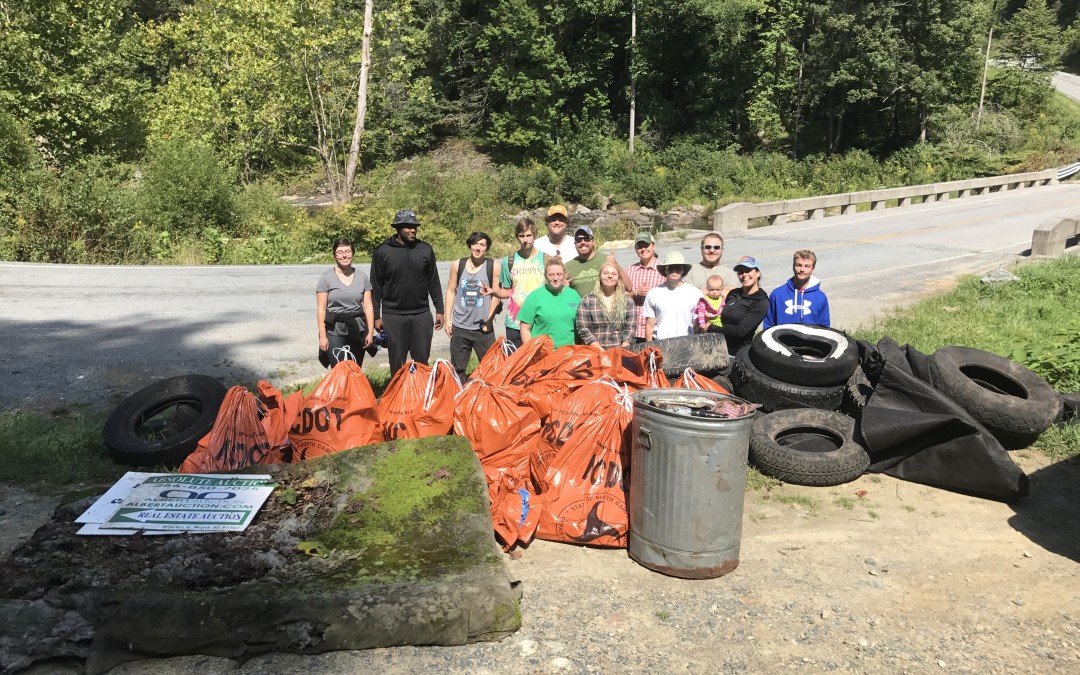
Sept. 26 2017
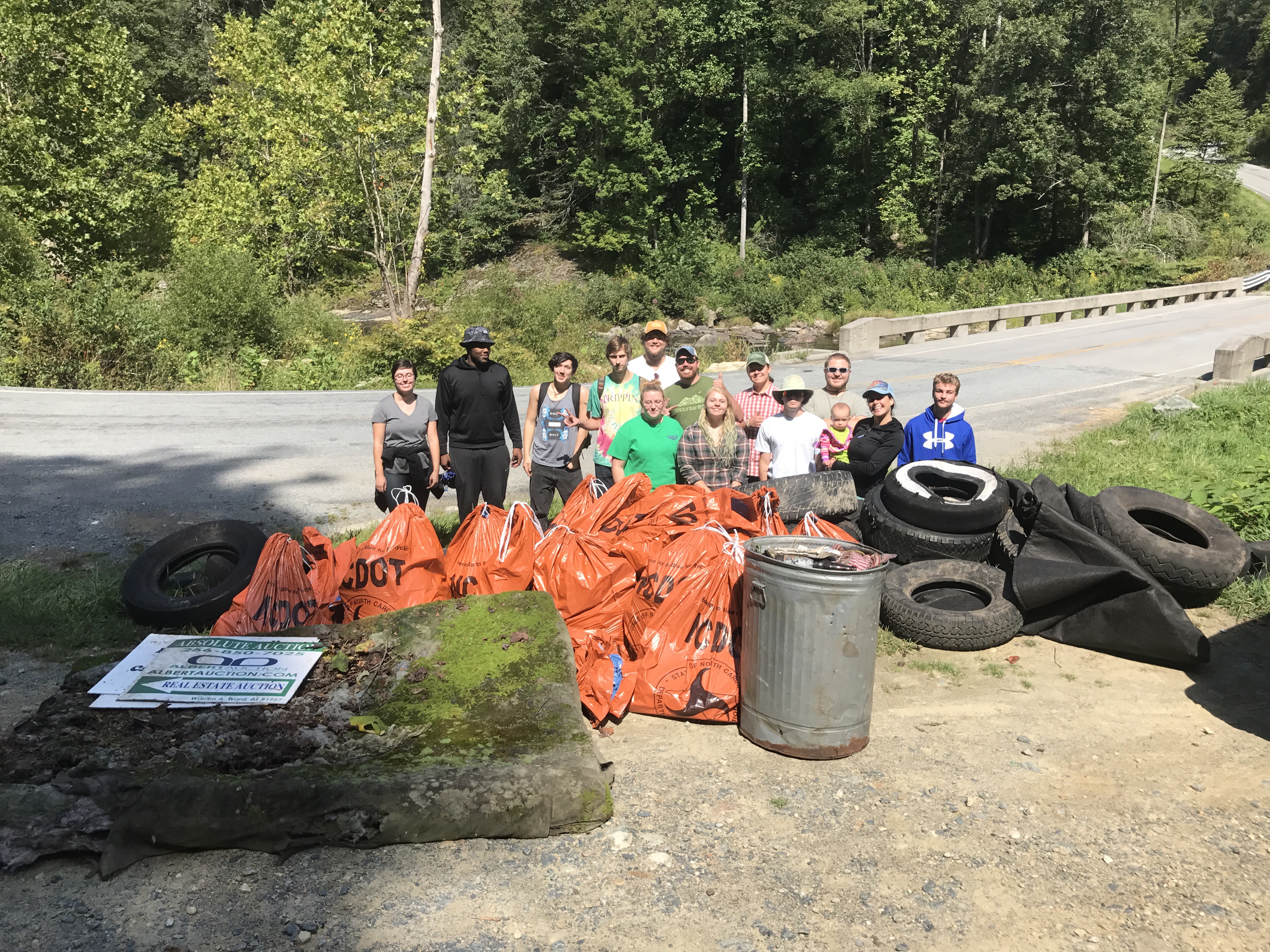
Community members and students turned out to carry 24 bags of trash out of the Guy Ford section of the Watauga River. In total, Big Sweep participants removed 7,810 pounds of trash from Western North Carolina’s waterways.
On September 9, more than 253 people from all walks of life turned out to remove more than 7,810 pounds of trash — 3.9 tons! — from Western North Carolina’s waterways as part of our 30th annual NC Big Sweep. Through a series of river and roadside cleanups in Buncombe, Henderson, Transylvania, and Watauga counties, Mountaintrue joined key partners Asheville Greenworks, the Waterkeeper Alliance and AmeriCorps Project Conserve to clean 50 miles of rivers and streams.
Gray Jernigan, MountainTrue’s Green Riverkeeper and Southern Regional Director, confirmed that the Big Sweep’s attendance this year “almost quadrupled” compared to last year. Why was the event such a success? “Thanks to the partnership and coordination with other great local organizations and businesses,” Gray says. “We’ve also recently expanded our Riverkeeper programs to include the Green and Broad Rivers, which builds our geographic reach and volunteer engagement in those areas.”
As a 30th annual event, Big Sweep falls into a long-standing tradition of volunteers in North Carolina cleaning up waterways in their communities. The event could not have happened without Asheville Greenworks, a key leader in the Big Sweep effort, or our Big Sweep sponsors, which included Asheville Outdoor Center, Griffin Waste Services, Sierra Nevada Brewing Co., Henderson County and French Broad Outfitters.
Fifteen members of the Hendersonville Rotary Club showed up in full force for the event, and were joined by State Senator Chuck Edwards in cleaning up Mud Creek.
“As a volunteer team leader, I find it to be really satisfying work,” said Don Huneycutt, the Big Sweep Team Captain for the Hendersonville Rotary Club. “ It takes a team and some hard work , but when you’re done, you can see that you made a real difference.”
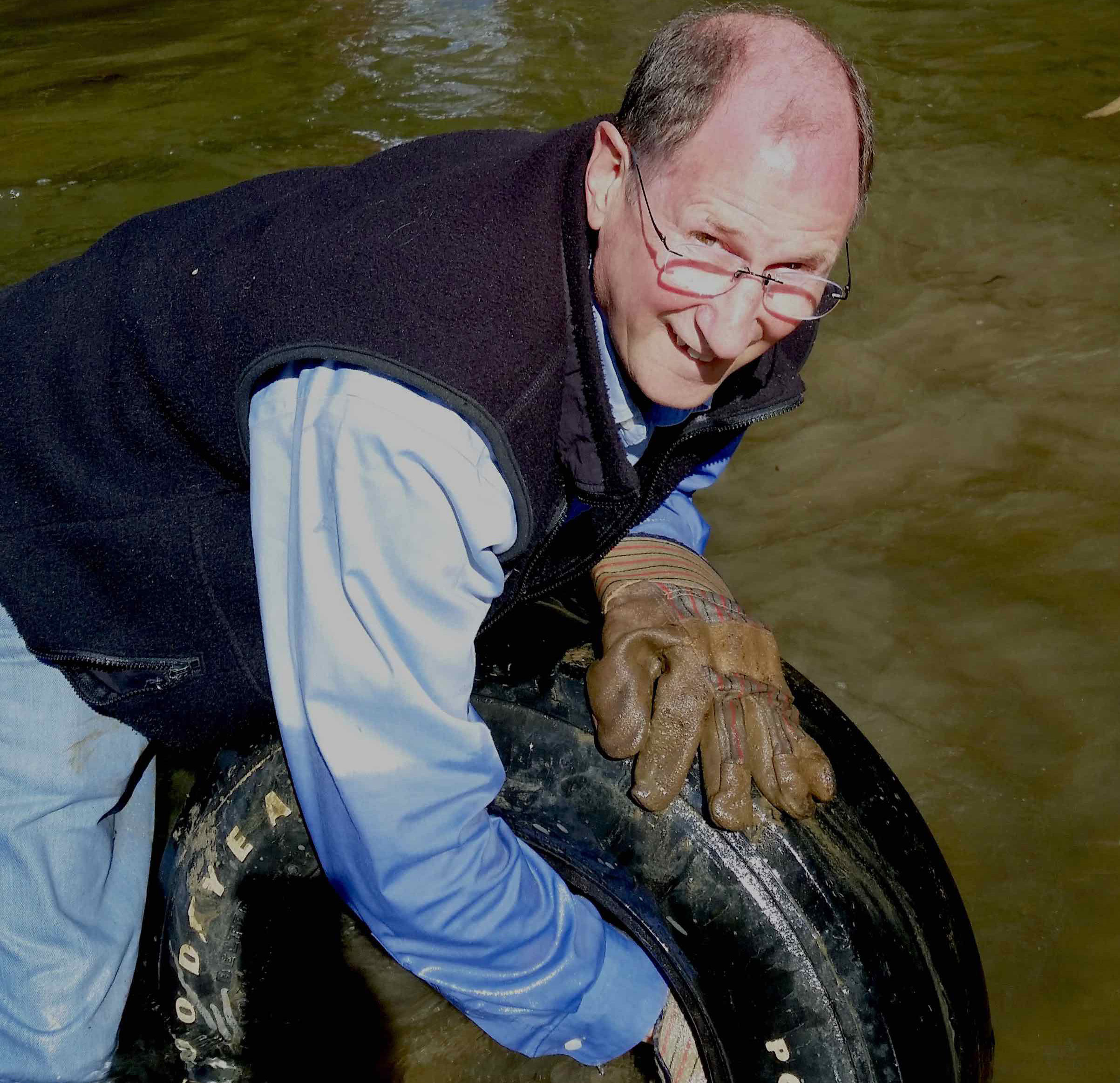
A volunteer with the Hendersonville Rotary Club removes a tire from Mud Creek.
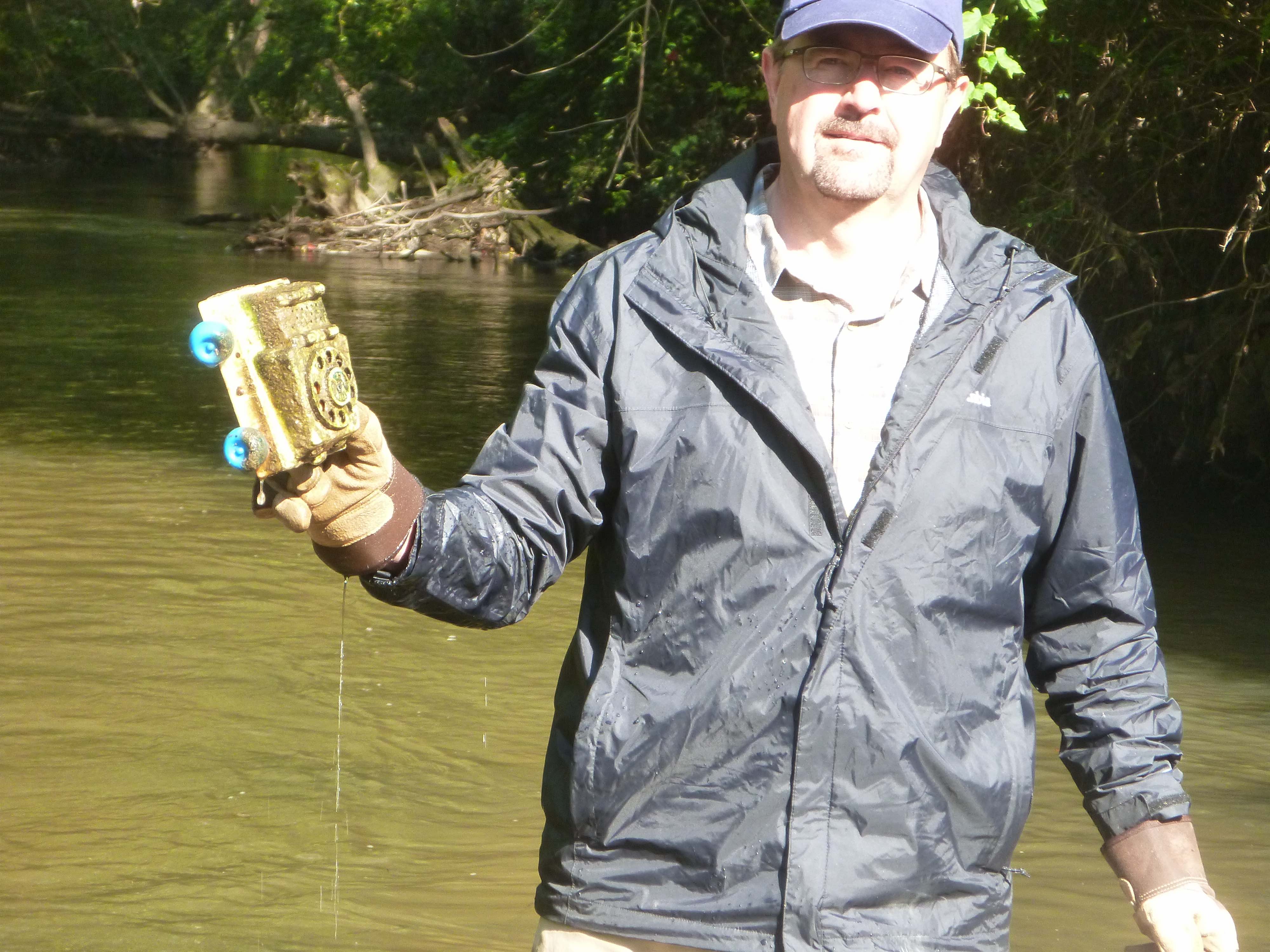
Our waterways attract quite the collection of bizarre trash. State Senator Chuck Edwards finds a toy ambulance in Mud Creek.
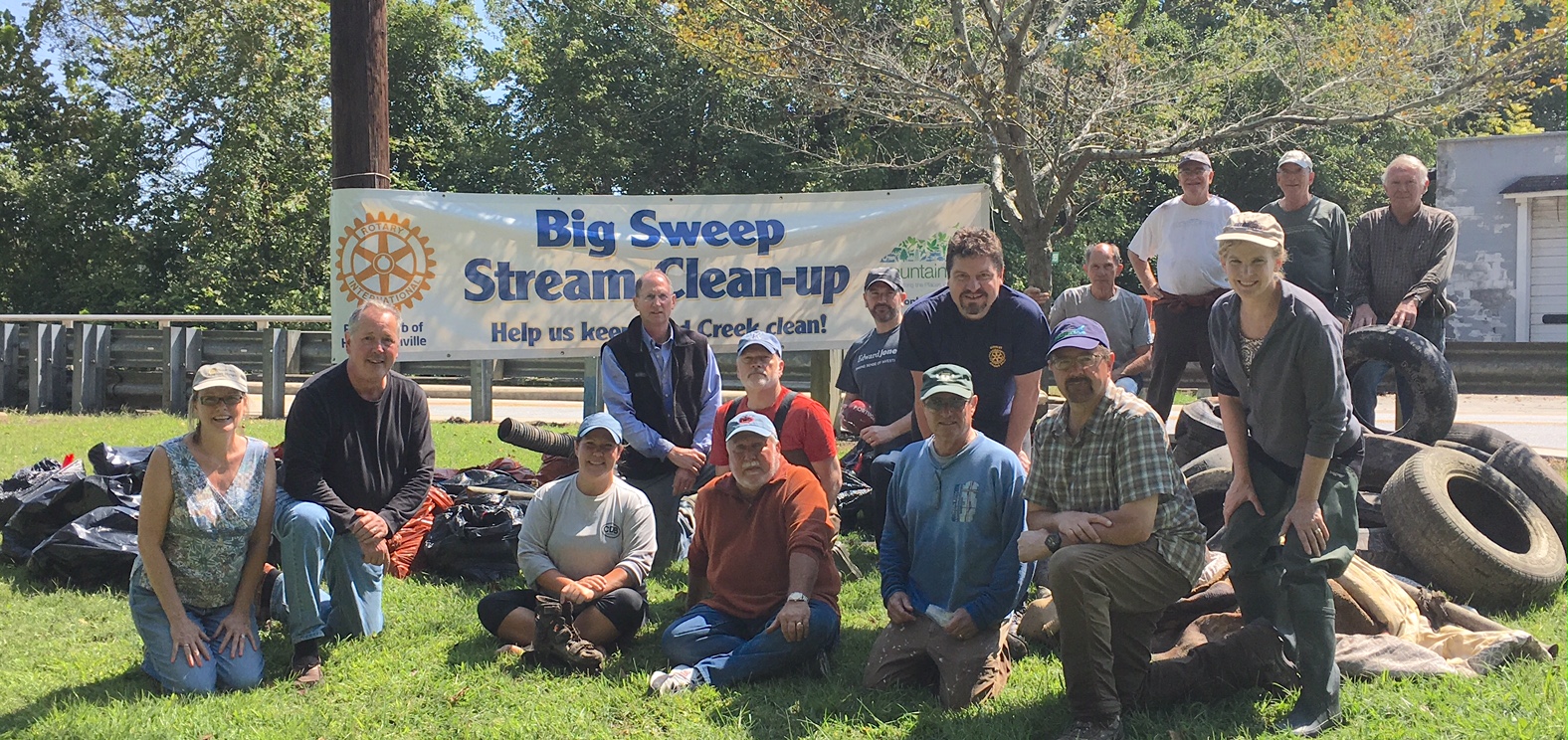
The Hendersonville Rotary Club with collected trash from Mud Creek. State Senator Chuck Edwards (front row, second from right) joined the group, wearing a MountainTrue hat.
The Broad River Alliance named the event their “Sarah Sweep” for the second year in a row in memory of Sarah Spencer, an active volunteer who was 26-years-old when she was killed in a car accident in 2016. The event served Sarah’s memory proud, as 22 volunteers turned out to remove 1400 pounds of trash – including 32 tires! – along five miles of the First Broad River.
The French Broad Riverkeeper’s team was based out of Westfeldt River Park, and mainly received volunteers from Asheville Greenworks and AmeriCorps Project Conserve on the French Broad in Transylvania County. (add numbers from cleanup) When the work was done, the volunteers enjoyed an after party at Westfeldt River Park sponsored by Sierra Nevada Brewing Co.
And in the High Country, a team of 20 volunteers cleaned up the Guy Ford section of the Watauga River, which was recently donated to Watauga County by the Blue Ridge Conservancy for recreation. “Thank you to all our amazing volunteers who made the 30th Annual Big Sweep a success,” said Andy Hill, Watauga Riverkeeper and MountainTrue’s High Country Regional Director. “[And] major appreciation to Edgar Peck and the Blue Ridge Conservancy for making Guy Ford Access another place for people to enjoy the Watauga River.” The cleanup crews, consisting mainly of community members and students, filled 24 bags of trash, including a tent, a mattress and a rusty trash can.
Volunteers in all of our regions noticed an abundance of a few particular pieces of trash: plastic bottles and tires. Plastic bottles remain a huge threat to our waterways, and the Big Sweep was a reminder to volunteers and community partners that litter on our streets often ends up in our streams and rivers as stormwater runoff. By tackling the problem at the source, efforts to reduce littering and careless garbage disposal can greatly reduce the burdens on our waterways each year.
Big Sweep participants also collected at least 115 tires this year, and some groups even had designated Tire Teams to remove them. Tires often end up in waterways because they are seen as too difficult or expensive to dispose of properly. Dumped in streams, they become environmental hazards. The best way to recycle tires is through your local county recycling program. Henderson and Transylvania counties will dispose of five tires for free per household, per year; Buncombe County accepts 10. For other items that are difficult to recycle, from packing peanuts, to printer cartridges, to dog crates, take note of Asheville Greenworks’ Hard-2-Recycle events here.
Thank you to all of our volunteers, community partners, and sponsors that made the Big Sweep happen this year. By helping us fund our Green, Broad, French Broad and Watauga Riverkeeper programs, you’re helping to remove thousands of pounds of trash from our waterways every year. We hope you’ll join us in your gloves and rain boots next year to make the next Big Sweep an even bigger success.
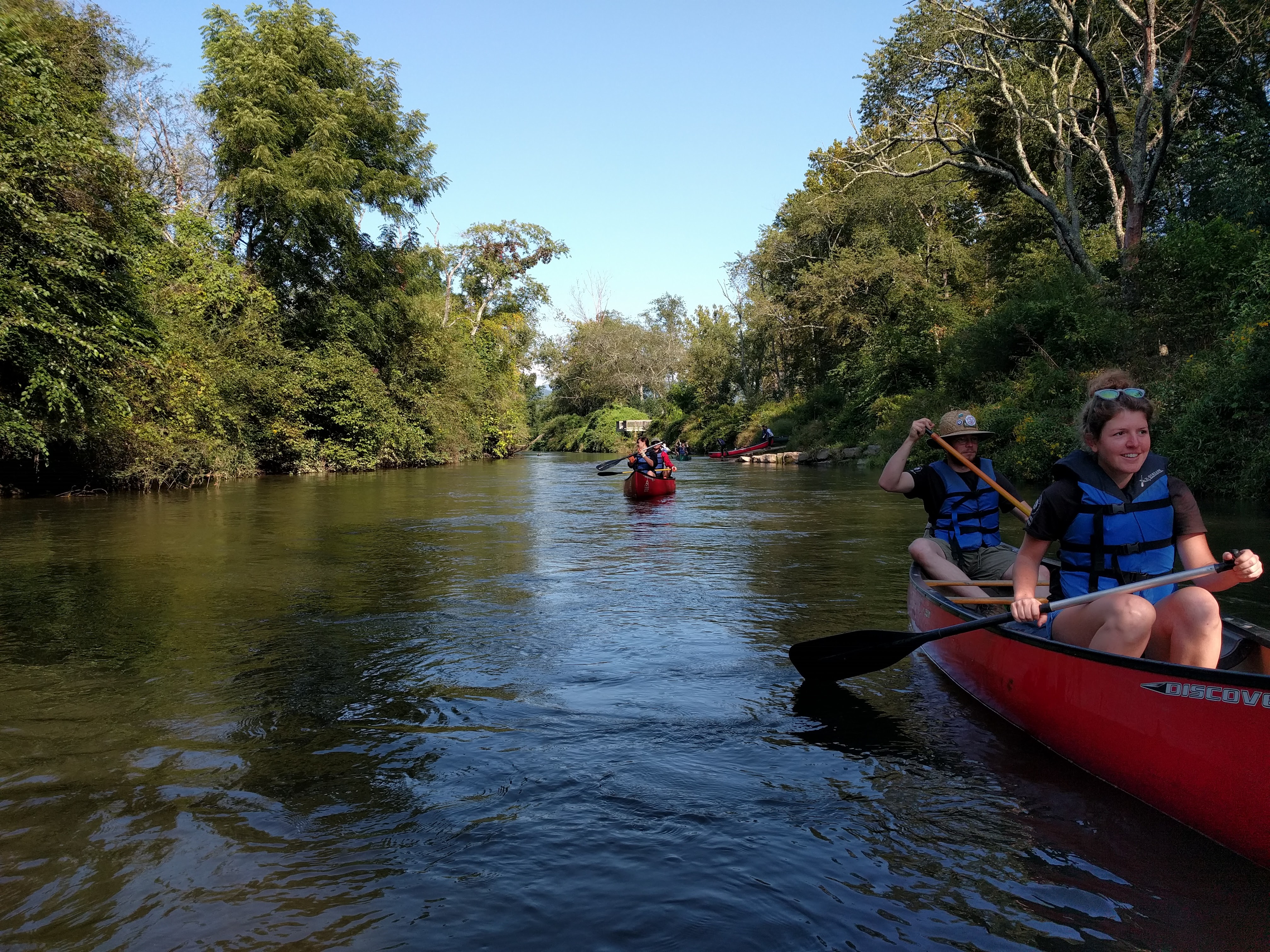
AmeriCorps Project Conserve Members clean up the French Broad River in kayaks.


MountainTrue is a $1.2 million nonprofit with offices in Asheville, Boone, Hendersonville and Franklin. The organization is best known for programs dedicated to monitoring and protecting area rivers and streams, managing for resilient and healthy forests, fighting the spread of non-native invasive plant species, and promoting renewable energy and energy efficiency. It also supports healthy communities and advocates for smart growth and multi-modal transportation investments that protect our environment. ADC, which has an annual budget of approximately $100,000, engages WNC residents in bottom-up design and planning projects to promote healthy, thriving and equitable communities.
“The merger creates one organization that is better able to pursuing a holistic approach to our built and natural environments,” explains Chris Joyell, executive director of the Asheville Design Center.
“This is a merger that benefits both organizations,” explains Carrie Turner, ADC board chair. “ADC will benefit from MountainTrue’s larger infrastructure and will be able to expand and develop more impactful programs. “MountainTrue, for its part, will gain ADC’s know-how when it comes to helping residents plan for the health of their own communities.”
“MountainTrue has the experience and capacity to organize the public in support of the kind of community-driven design planning that ADC is expert at conducting,” explains Bob Wagner, co-director of MountainTrue. “By aligning our work, we’ll be able to better meet the needs of people throughout WNC.”
The merger of the Asheville Design Center and MountainTrue is the latest development in a long history of cooperation between two organizations committed to smart planning and promoting healthy, equitable and environmentally sustainable communities.
Collaboration between the Asheville Design Center and MountainTrue goes back to 2009 when the two organizations created Blue Ridge Blueprints — a grassroots planning program to help communities plan for and design their futures while preserving local character and protecting the natural environment. Through Blue Ridge Blueprints, ADC and MountainTrue partnered with residents to develop the Burton Street Community Plan when that neighborhood was threatened by the proposed I-26 Connector.
The Burton Street community had recently overcome issues of crime, poor infrastructure and shifting demographics, and, in 2010, a plan to expand I-26 threatened to impede this progress and displace many long-time residents. At the invitation of the community, ADC and MountainTrue worked with local residents to develop a vision, goals and strategies to achieve those goals. ADC design volunteers conducted numerous surveys and workshops to inform a community plan, while MountainTrue organized the community and helped participants prioritize goals for implementation.
The Burton Street Community Plan helped spur the adoption of the Smith Mill Creek Greenway into the City’s greenway master plan and prompted ADC’s DesignBuild Studio to construct an outdoor classroom for the Burton St. Community Peace Garden.
This work helped us establish our trajectory when MountainTrue and the ADC worked side-by-side on the I-26 Connector Project to push for a design that minimized the highway’s footprint and its impacts on Asheville’s neighborhoods, including Burton Street. ADC worked directly with affected communities through a participatory planning process and then offered detailed improvements to the North Carolina Department of Transportation that were supported by the people. MountainTrue subsequently worked with specifically impacted neighborhoods to generate and maintain support for the principles underpinning ADC’s proposed highway design.
“We had both strong, consistent public support and good design principles. That gave us credibility and power,” says Julie Mayfield, co-director of MountainTrue. “In 2016, we made history when NCDOT selected a variation of ADC’s design, Alternative 4B, as the first community-authored highway design ever to be adopted by a state DOT.”
These real-world examples of collaboration light the path forward: one organization better able to support more communities across the region in building a better, healthier and cleaner WNC for all.
Asheville Design Center is inviting its members and supporters to celebrate the merger with a toast at MountainTrue’s upcoming Annual Gathering at New Belgium on October 25 from 6-8 pm. The Annual Gathering is open to all members. Contributing supporters of ADC will receive a complimentary one-year membership to MountainTrue.
Media Contact:
Karim Olaechea
MountainTrue Communications Director
C: 415-535-9004
E: karim@mountaintrue.org
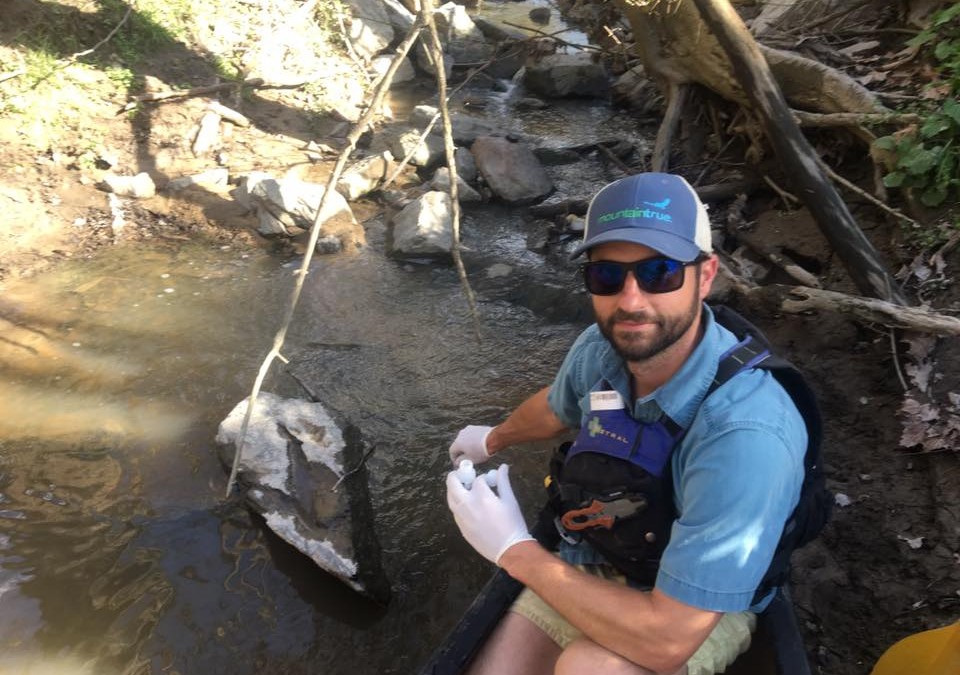
Dear Supporter,
How far would you go to keep our mountain rivers clean? Would you climb 12 feet down into a sewer drain and tromp through … ? Well, that’s exactly what MountainTrue’s French Broad Riverkeeper Hartwell Carson did when he lowered himself into a deep, dark storm drain in the Asheville River Arts District and asked his coworker “What’s the plan if I can’t climb back out?” She just shrugged.
 It took months of sleuthing, but Hartwell found the source of E. coli pollution that was draining into the French Broad River and threatening the safety of swimmers, boaters, and fishermen. It’s a fun and important story that you can read more about in our summer newsletter or by going to www.mountaintrue.org.
It took months of sleuthing, but Hartwell found the source of E. coli pollution that was draining into the French Broad River and threatening the safety of swimmers, boaters, and fishermen. It’s a fun and important story that you can read more about in our summer newsletter or by going to www.mountaintrue.org.
Please, support MountainTrue today so that we can continue this important work.
This is what sets MountainTrue apart. Our volunteers monitor 25 sites along the French Broad River in the summer — and many more year-round — and our staff will stop at nothing to make sure your mountain rivers are clean and safe. As a matter of fact, MountainTrue has four Waterkeeper Affiliates protecting the Broad, French Broad, Green, and Watauga river watersheds.
In addition to keeping our waters clean, MountainTrue protects the health of our forests, fights for a clean energy future, and works to create strong vibrant communities through smart planning.
By supporting MountainTrue today, you are:
monitoring timber sales, fighting invasive pests, and protecting our old-growth tree stands;
campaigning to clean up coal ash pollution and for more renewable energy for WNC;
partnering with marginalized communities to make sure they receive a fair shake in large infrastructure projects like the widening of I-26 through Asheville; and
lobbying in Raleigh, keeping an eye on new legislation, and working with legislators to protect our mountains.
Our work relies on our members who know and appreciate our special mountain region. We hope you will continue to support us by donating today!
Thank you!
Bob Wagner
Julie Mayfield
MountainTrue Co-Directors
MountainTrue is the most experienced grassroots organization in the region, working with communities across 23 counties on the issues that matter most to sustaining our natural resources.
Our collaborative work among community groups, government, and private industry often catches the public eye. MountainTrue also works to engage communities voices in the media to speak out for keeping our forests healthy, our air and water clean and our communities vibrant.
Catch up on our news here.
Click here to subscribe to our different news and alert services including our Vistas E-Newsletter, #MTRaleigh Legislative Updates, MountainTrue Action Alerts and Creation Care Alliance News.